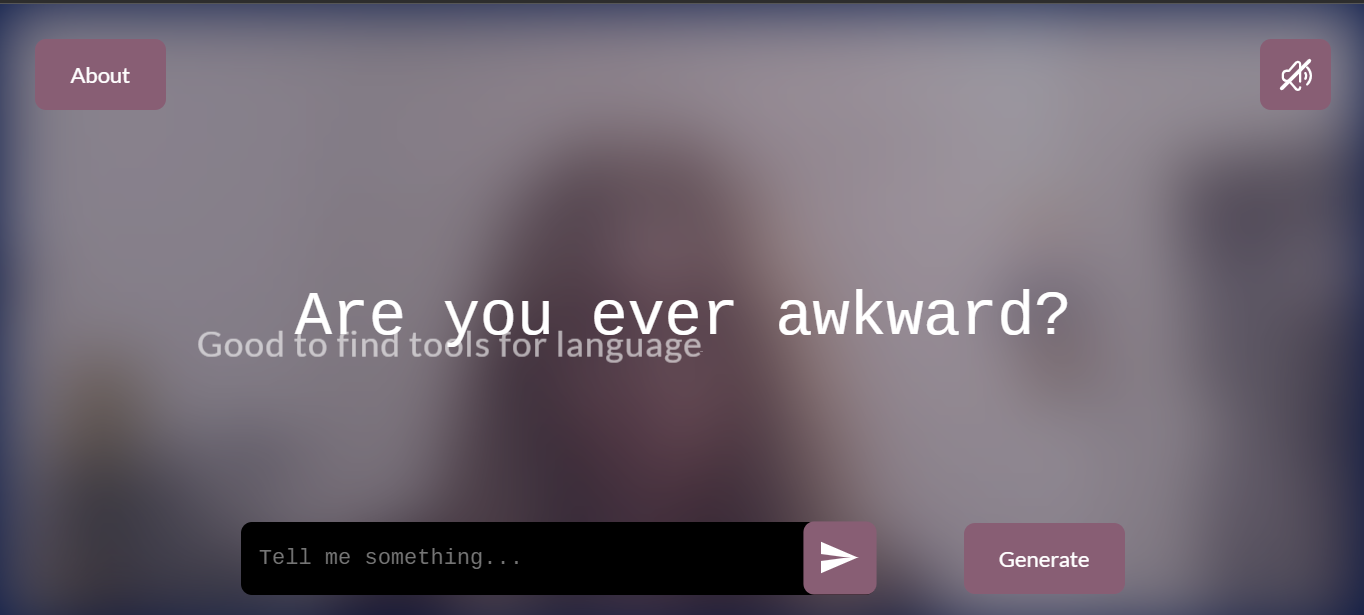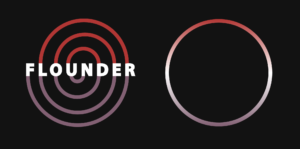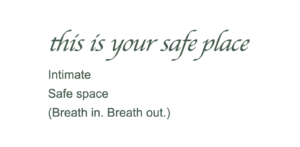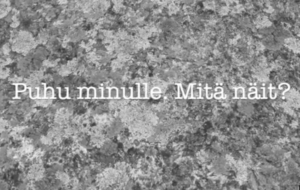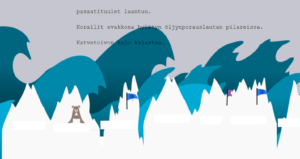In this guest curator issue of 2021 we will be publishing five new works of digital literature, produced in the workshop phase of digital literature project di.ki. They are presented by Elina Sallinen, coordinator of the project.
These works had their beginnings in a three-day Digital Literature Hackathon organized in April 2021, where the genre’s representatives commingled and together developed concepts for new pieces of digital literature. All of the working groups behind the works published in this issue were formed while producing these very pieces, which all incorporate themes of climate crisis, nature, and communication. Gamification, machine learning, and interactivity were key to the form of the works. They were first debuted in the Night of Digital Literature at Cinema Orion on 19 August 2021, as part of the Poetry Moon festival.
Flounder
Flounder is a web application and installation that studies social awkwardness, with which the reader may have a conversation. It analyzes the reader through a webcam and written discussion, and then assesses their potential friendliness or enmity. The work functions based on self-learning algorithms and the processing of natural languages, by which it analyzes the language input it receives. This is all reflected in the soundscape as well as the poem that is generated when the reader ends the dialogue. This may take a while, as many readers find speaking with Flounder to be fascinating. Flounder was also present in its installation form at the Night of Digital Literature, in which the reader had the opportunity to have the conversation face to face. The cute and beautiful-sounding installation was the hit of the night at Cinema Orion. The working group for Flounder includes Marloes Van Son, Veera Jussila, Santeri Salmirinne, Joonas Puuppo, Pyry Rouvila, and Lauri Hei.
{[[(爱 (ài) <3)*],
[(<3 爱 (ài))*],
[((ài) <3 爱)*]]}
Another machine learning-based piece by Liisi Soroush, Camilo Sanchez, Gurden Batra, and Agam Batra processes the reader’s hate speech, based on their own experiences, into poetry, essentially translating the anger into a pleasantness universal, “speech – 2 – <3”. The name of the work is not pronouncable by humans, but it may be written out thus:
{[[(爱 (ài) <3)*],
[(<3 爱 (ài))*],
[((ài) <3 爱)*]]}
It is well worth visiting the dedicated website of this work of digital literature for more information on the multi-layered and highly conceptual background terminology and processes behind it. the transformation into the language of poetry involves elements as disparate as cryptocurrencies, hate speech cacophony, and the heart of a fetus beating. The work is emotionally powerful; it requests the reader’s own personal experiences of hate speech as input material. The work is also multilingual, being available in six different languages.
Puhu minulle
An interactive dialogue with the reader is also the premise of the work Puhu minulle (“Speak to me“) by Heidi Halonen, Maija Saksman, and Kati-Annika Ansas. It is a work of multimedia poetry, which shows the reader-viewer video poem images of forests, trees, ticks, and graphics in one moment, and in another asks for a personal reading experience in spoken form. The work generates a poem for the reader based on these experiences. The forest and tree-themed video poems as well as the visual poems formed of graphemes and their accompanying soundscapes are intense vignettes that enable or activate the onset of physically responsive reading experiences.
Meren hengitys
Gamification and interactivity are front and center in all of the works here published. The piece Meren hengitys (“Breath of the sea“) by Timo Salo, Tuukka Pasanen, Sanna Telkki-Kova, and Riika Helle-Kotka is a game awash in historical video game aesthetics where the player’s task is to leap from one melting ice floe to another, avoid the jaws of a terrible sea monster, and collect aphorisms and poems on the way along the glacier.
Mukavalla asialla
Another interactive game Mukavalla asialla (“Don’t Hang Up“) has the player taking the role of a telemarketer or their customer, and playing with three strategic tactics: logos, pathos, and ethos. Using these they must attempt to either sell the in-game product or refuse to purchase it. The colorful voice acting delights the player and creates an environment akin to radio theater. This game is optimized for mobile use, but is playable on other devices as well. The working group is Hilkka Haaga, Lea Kalenius, Joonas Kinnunen, Frida Maria Pessi, Miia Seppänen, and Sanna Vakkala.
On the homepage for the project you can find all sorts of intriguing content, such as correspondence between poet Cia Rinne and poet, Tuli & Savu editor Paavo Kässi concerning digitality and literature; and student productions based in interactive literature from Federico Simeon and Kirsi-Marja Moberg, composed at the Interactive Poetry course at Aalto University; and much more.
The di.ki project will also announce the publication of poet-researcher Matti Kangaskoski’s podcast series, which takes its topics from digital environments, literature, and literacy. The conversation goes deep on phenomena such as lava lamps, instagramming, kinetic text, the history of digital literature, digital surveillance, algorithms, and the relationship between voice and text. As guests the podcast episode features essayist-author Silvia Hosseini, sound poet Olli Aarni, poet Eino Santanen, author-researcher Markku Eskelinen, and researchers Laura Piippo, Heikki Heikkilä, and Minna Ruckenstein. In other words, quite a buffet for anyone interested in themes of digital literature! All the episodes will be released in the coming weeks here on the Nokturno website and on most common podcast services such as Apple and Spotify.
But for now, I wish you the joy of reading and sharing the works of literature presented here!
For the Digital Literature Project,
Elina Sallinen
Translated by Kasper Salonen

